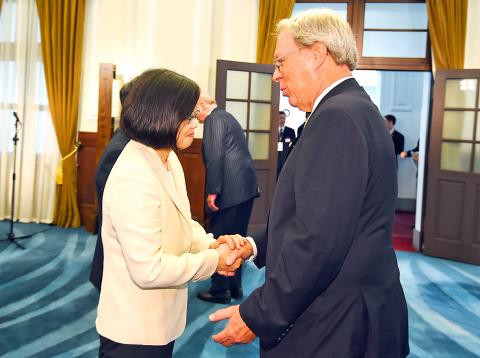The term “1992 consensus” was non-existent until 2000, when then-Mainland Affairs Commission chairman Su Chi (蘇起) first used it, American Institute in Taiwan (AIT) Chairman Raymond Burghardt said.
Burghardt made the remarks in an interview with Voice of America in Washington on Wednesday when he was asked about the historical background of the so-called “1992 consensus,” as he was formerly the US consul-general in Shanghai.
“I think everyone in China knows, the term ‘1992 consensus’ was not used by anyone until 2001, no, 2000; Su Chi, [former] president Ma Jing-jeou’s [馬英九] first National Security Council adviser, was the first person to use that term to describe the understanding that had been reached in 1992. Before that, I mean, in all the time I met with [then-Association for Relations Across the Taiwan Straits (ARATS) chairman] Wang Daohan (汪道涵) or with [then-Straits Exchange Foundation (SEF) chairman] Koo Chen-fu (辜振甫), they never called it that, never called it the ‘1992 consensus,’ because the name didn’t exist. Koo would sometimes just call it the ‘1992 understanding,’” he said.

Photo provided by Taipei Photojournalists Association
The “1992 consensus” refers to a tacit understanding between the two sides of the Taiwan Strait that there is “one China,” with each side having its own interpretation of what “China” means.
In 2006, Su, then a Chinese Nationalist Party (KMT) legislator, admitted he made up the term “1992 consensus” in 2000, before the KMT handed power to the Democratic Progressive Party.
Meanwhile, responding to the question of whether President Tsai Ing-wen (蔡英文) was muddying the water when she did not explicitly recognize or deny the “1992 consensus” or the “one China” principle in her inauguration address, Burghardt said Tsai has displayed flexibility in dealing with cross-strait relations and it is important for both China and Taiwan to continue to communicate.
He also said it is important for both sides to “create a certain amount of ambiguity,” adding that there was a lot of ambiguity in the understanding reached between the Ma administration and China.
Burghardt said this is an important period for both Beijing and Taipei to carefully watch each other’s actions and statements.
However, he also said it is very important for both sides to “keep an open mind” and maintain communication.
Burghardt said that one of the things the US prized very much after Ma took office in May 2008 was the “restoration of regular communication across the Strait.”
He said that if both sides can talk to each other, miscommunication, misunderstanding and miscalculation “can all be avoided.”
Asked whether cross-strait relations are not as warm as during the Ma administration, Burghardt said that “it is unfortunate that Beijing decided to discontinue or suspend talks” between the two sides recently.
He expressed hope that Beijing can understand the importance of cross-strait communication and will want to continue, as “nothing is going to be fixed without continued communication.”

MAKING WAVES: China’s maritime militia could become a nontraditional threat in war, clogging up shipping lanes to prevent US or Japanese intervention, a report said About 1,900 Chinese ships flying flags of convenience and fishing vessels that participated in China’s military exercises around Taiwan last month and in January have been listed for monitoring, Coast Guard Administration (CGA) Deputy Director-General Hsieh Ching-chin (謝慶欽) said yesterday. Following amendments to the Commercial Port Act (商港法) and the Law of Ships (船舶法) last month, the CGA can designate possible berthing areas or deny ports of call for vessels suspected of loitering around areas where undersea cables can be accessed, Oceans Affairs Council Minister Kuan Bi-ling (管碧玲) said. The list of suspected ships, originally 300, had risen to about 1,900 as

Japan’s strategic alliance with the US would collapse if Tokyo were to turn away from a conflict in Taiwan, Japanese Prime Minister Sanae Takaichi said yesterday, but distanced herself from previous comments that suggested a possible military response in such an event. Takaichi expressed her latest views on a nationally broadcast TV program late on Monday, where an opposition party leader criticized her for igniting tensions with China with the earlier remarks. Ties between Japan and China have sunk to the worst level in years after Takaichi said in November that a hypothetical Chinese attack on Taiwan could bring about a Japanese

MORE RESPONSIBILITY: Draftees would be expected to fight alongside professional soldiers, likely requiring the transformation of some training brigades into combat units The armed forces are to start incorporating new conscripts into combined arms brigades this year to enhance combat readiness, the Executive Yuan’s latest policy report said. The new policy would affect Taiwanese men entering the military for their compulsory service, which was extended to one year under reforms by then-president Tsai Ing-wen (蔡英文) in 2022. The conscripts would be trained to operate machine guns, uncrewed aerial vehicles, anti-tank guided missile launchers and Stinger air defense systems, the report said, adding that the basic training would be lengthened to eight weeks. After basic training, conscripts would be sorted into infantry battalions that would take

DEEP-STRIKE CAPABILITY: The scenario simulated a PLA drill that turned into an assault on Taiwan’s critical infrastructure, with the launchers providing fire support Taiwan yesterday conducted this year’s first military exercises at Longsiang Base in Taichung, demonstrating the newly acquired High Mobility Artillery Rocket System’s (HIMARS) ability to provide fire support and deep-strike capabilities. The scenario simulated an attack on Penghu County, with HIMARS trucks immediately rolling into designated launch areas and firing barrages at the Wangan (望安) and Cimei (七美) islands, simulating the provision of fire support against invading forces. The HIMARS are supposed to “fire and leave,” which would significantly increase personnel and equipment survivability, a military official said. The drill simulated an exercise launched by the Chinese People’s Liberation Army (PLA) Eastern